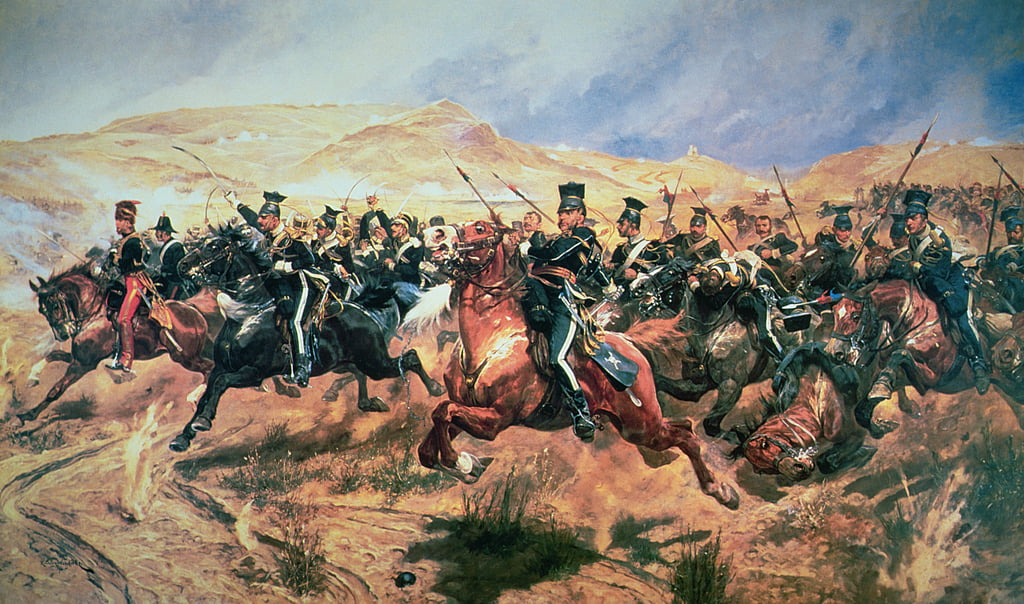Note: If you wish to receive, via e-mail, (1) my weekly newsletter or (2) daily copies of these posts, notify me at [email protected] and indicate which you would like. I promise not to share your address.
Tuesday
Greg Olear, who writes regular Substack essays on political issues, devotes each Sunday column to a favorite poem. In his last two, he has applied the poems to current events in a way that I embrace. Two Sundays ago, he compared Donald Trump to Kubla Khan in Coleridge’s famous poem, and this past Sunday he sees Russia’s invasion of Ukraine in Tennyson’s “Charge of the Light Brigade.”
To be sure, the shoe is on the other foot. Instead of the Russians rushing suicidally towards Kyiv or Bakhmut, at the Battle of Balaclava it was they who were playing the part of the Ukrainians, picking off members of the Light Brigade as it charged “into the jaws of death, into the mouth of hell.” Here’s the poem:
I
Half a league, half a league,
Half a league onward,
All in the valley of Death
Rode the six hundred.
“Forward, the Light Brigade!
Charge for the guns!” he said.
Into the valley of Death
Rode the six hundred.
II
“Forward, the Light Brigade!”
Was there a man dismayed?
Not though the soldier knew
Someone had blundered.
Theirs not to make reply,
Theirs not to reason why,
Theirs but to do and die.
Into the valley of Death
Rode the six hundred.
III
Cannon to right of them,
Cannon to left of them,
Cannon in front of them
Volleyed and thundered;
Stormed at with shot and shell,
Boldly they rode and well,
Into the jaws of Death,
Into the mouth of hell
Rode the six hundred.
IV
Flashed all their sabres bare,
Flashed as they turned in air
Sabring the gunners there,
Charging an army, while
All the world wondered.
Plunged in the battery-smoke
Right through the line they broke;
Cossack and Russian
Reeled from the sabre stroke
Shattered and sundered.
Then they rode back, but not
Not the six hundred.
V
Cannon to right of them,
Cannon to left of them,
Cannon behind them
Volleyed and thundered;
Stormed at with shot and shell,
While horse and hero fell.
They that had fought so well
Came through the jaws of Death,
Back from the mouth of hell,
All that was left of them,
Left of six hundred.
VI
When can their glory fade?
O the wild charge they made!
All the world wondered.
Honour the charge they made!
Honour the Light Brigade,
Noble six hundred!
People debate whether the poem praises or condemns war. I’ve worried that it glorifies senseless sacrifice and in doing so may have played a destructive role in World War I. Yes, I know it’s only a poem, but it may have inspired “children ardent for some desperate glory” (to quote Wilfred Owen) to surrender their lives unthinkingly. Many would have known the poem by heart and may well have repeated to themselves “cannon in front of them volleyed and thundered” as they went over the top to charge German positions.
Olear, however, counter argues that the poem captures the senselessness of the war:
But I would argue that “Theirs not to make reply / Theirs not to reason why / Theirs but to do and die,” quite the best lines in the poem, can also be read not as praise for valor but as condemnation of the whole sordid enterprise. Can we not “honour the Light Brigade” by learning its dread lesson and not sending our soldiers off to certain death for no good reason? The Crimean War is basically shorthand for “no good reason.”
While World War I was a stupid war, Olear writes in his column that the Crimean War was even stupider. Basically, it was Russia taking advantage of a dying Ottoman Empire to make a land grab while the Turks, French and British resisted. And if that sounds familiar, wait till you hear what the 1910 Encyclopedia Britannica (quoted by Olear) says about the war’s impact on Russia at the time:
Thus Nicholas, the pillar of the European alliance, found himself isolated and at war, or potentially at war, with all of Europe. The invasion of Crimea followed, and with it a fresh revelation of the corruption and demoralization of the Russian system. At the outset Nicholas had grimly remarked that “Generals January and February” would prove his best allies. These acted, however, impartially; and if thousands of British and French soldiers perished of cold and disease in the trenches before Sevastopol, the tracks leading from the centre of Russia into the Crimea were marked by the bones of Russian dead.
I’d like to say, with Marx, that history repeats itself, the first time as tragedy, the second time as farce. Marx was comparing Napoleon I with Napoleon III and we could say that Putin is a wannabe Tsar Nicholas I, who actually succeeded in expanding Russia’s borders. But like Putin, Nicholas got his butt kicked in Ukraine (or at least Crimea) and may have committed passive suicide as a result. (He refused to get medical help for his pneumonia.)
Would the Light Brigade have been honored had Tennyson not written his poem? Or would it have been regarded the way that we see the Wagner mercenary group’s attacks on Bakhmut, a mission costing Russia 20,000 casualties in order to give Putin a short-term victory. I suspect the latter.
Poetry, as Plato complained, can be dangerous in that way, bamboozling through beauty. In the Republic he calls poets “deceivers” who deck out their illusions with meter, harmony, and rhythm. If we were to strip away their poetic aids, he contends, poets would make “a poor appearance” and we would see poetry for the fraud it really is.
Normally I disagree with Plato when it comes to poetry. But in this case, he may be right.
